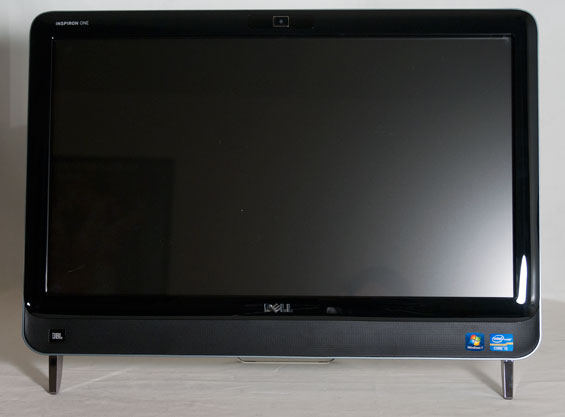Our last Windows all-in-one review was for HP's TouchSmart 610, an interesting if slightly pricey piece of desktop kit. HP brought a lot of innovation to the table but they couldn't quite patch over the underlying problems with the hardware and software ecosystems that keep a touch-based all-in-one from really achieving all it can. Today we have on hand the Dell Inspiron One 2320, complete with Dell's own touch-based software interface and its own bells and whistles. Is Dell able to smooth over those issues better than HP could, or did they stumble on to some new ones?

| Dell Inspiron One 2320 Specifications | |
| Processor | Intel Core i5-2400S (4x2.5GHz, 3.3GHz Turbo, 32nm, 6MB L3, 65W) |
| Chipset | Intel H61 |
| Memory | 2x4GB Hynix DDR3-1333 SODIMM (Max 2x4GB) |
| Graphics | NVIDIA GeForce GT 525M 1GB DDR3 (96 CUDA cores, 600/1.2GHz/1.8GHz core/shader/memory clocks, 128-bit memory bus) |
| Display | 23" LED Glossy 16:9 1080p |
| Hard Drive(s) | Seagate Barracuda XT 2TB 7200-RPM SATA 6Gbps HDD |
| Optical Drive | Blu-ray reader/DVD+/-RW writer (HL-DT-ST CT30N) |
| Networking | Realtek PCIe Gigabit Ethernet Intel Centrino Advanced-N 6230 802.11a/b/g/n Bluetooth 3.0 |
| Audio | Realtek ALC269 HD Audio Stereo speakers Headphone and mic jacks |
| Front Side | Webcam Speaker grilles |
| Right Side | Optical drive Input button Power button |
| Left Side | Brightness control Volume control Headphone and mic jacks 2x USB 2.0 SD/MMC/XD/MS Pro card reader |
| Back Side | Kensington lock HDMI input Composite input Optical out Antenna jack Antenna jack for NTSC/OTA ATSC input VGA output Ethernet jack Surround jack 4x USB 2.0 (one taken by wireless mouse and keyboard receiver) |
| Operating System | Windows 7 Home Premium 64-bit |
| Dimensions | 22.25" x 2.5" x 17" (WxDxH) |
| Weight | 18.85 lbs |
| Extras | Webcam Wireless keyboard and mouse Flash reader (MMC, SD/Mini SD, MS/Duo/Pro/Pro Duo) Blu-ray writer Touchscreen JBL speakers |
| Warranty | 1-year basic support (optional 3-year) |
| Pricing | Starting at $599 Price as configured: $1,249 |
The graphics hardware takes the hit, though. I ranted a bit about the lack of a proper ecosystem in my HP TouchSmart 610 review, but here it's particularly egregious. Dell opts for a lowly NVIDIA GeForce GT 525M as the fastest GPU you can get in the Inspiron One 2320 line. The desktop GeForce GT 430 it's descended from was already pretty dire to begin with, but just 96 CUDA cores running at 600MHz (1.2GHz on the shaders) and just 1.8GHz of DDR3 on a 128-bit memory bus isn't going to cut it for a 1080p display. We've tested this chip on Dell's XPS 15z as well, and really it's only good for medium detail 720p gaming. This is the same issue I had with HP's all-in-one, only here it's amplified because there had to have been thermal headroom in the Inspiron One 2320 for at least the GeForce GT 540M. I'd complain about that, too, but not quite so vocally.
When I spoke to HP's representative about the meager graphics hardware in the TouchSmart, she suggested that it was really meant to be more of a family computer and thus didn't need particularly aggressive graphics hardware. That may be the case, but it undermines the necessity of a dedicated GPU to begin with. The fact is that these mobile graphics chips were designed for notebooks with 768p screens, and at that resolution they're fine. On an all-in-one, though, they're much harder to justify and really speak to a fundamental problem with the all-in-one ecosystem: we need an in-between point for graphics hardware. What we really need for 1080p AIO systems is at least GT 555M or (preferably) GTX 560M level hardware; we've seen such chips in 14" and 15" notebooks; would it really be that hard to stuff something faster into a significantly larger AIO system? The GT 525M upgrade from the base model Inspiron One 2320 ends up costing over $200, and for that price it just doesn't add enough performance.
The rest of the Inspiron One 2320 is capable enough, and Dell seems to be gunning for more of a true family machine with it by including VGA, composite, and HDMI inputs, suggesting that even when the computer inside it isn't particularly great anymore, you can still use it as a monitor. It also supports Intel's WiDi, and the hard drive inside is a full 3.5" drive.
Source: AnandTech
No comments:
Post a Comment